Aims of 3L Education
Life Education - All teachers and students "know life, respect life, treasure life, and care for the self and family"
Living Education - Treasure life, learn daily life knowledge, master social skills, foster good living habits, care for others and the group, and establish proper goals for living
Life Improvement Education - Learn how to live better, protect and treasure the environment, reinforce the will to live, improve adaptation skills and creative capability.
The Baxueyuan kindergarten became widely known through a documentary film entitled "Kids Kingdom" in 2009. In Sep 21, 2010, I was fortunate enough to visit Baxueyuan. There, I was impressed by the kindergarten with its artistic environment and family warmth, and felt the spirit of the LLS Education.
1. Environment with a feeling of daily life
Baxueyuan Huo Yinghua kindergarten is located in a very ordinary residential neighborhood, but the artistic and warm atmosphere can be felt throughout the kindergarten. According to the founder of the Baxueyuan, Yueer Li (people call by her nickname, "Big Li"), she designed every detail from the beginning, from the way the windows open and the color of curtains to the lighting in the corridor.
Because of the rain, all the visitors' shoes were covered with mud. Looking at the clean wooden floor, we felt some embarrassed. Big Li pointed to a small table at the entrance and told us said, it didn't matter--we could wipe our shoes with some cloth. For ecological reasons, they do not use shoe-covers.
The decoration of hall is very distinctive: a historic cabinet, hand-made knit dolls and some wood of various shapes collected by Big Li from everywhere. Children also can sit on the wood if they want.
In the corridor, besides wall paintings, there are only some small closets outside every classroom, one for each class. Because there is nothing else, it looks clean and orderly. Except for some paintings that she had done, Big Li told us that all of the other works had been done by the children. Taking a close look at the paintings, you will find they do come from a child's hands. However, the elaborate frames made them look so fabulous. I think when children see their works on exhibition, they must feel a sense of achievement and a sense of belonging.
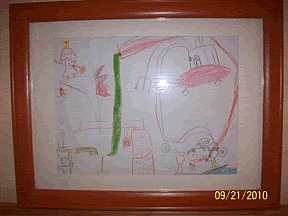 |
 |
| The left is Yueer Li's work, the right is a child's work. | |
Entering the classroom
There are 8 classes in this kindergarten. Each class is characterized by a particular name, for example, the peanut class, bean class, pear class and so on. by The children and the teachers choose their class name after thinking about it and discussing it together. Then they make a class card together and hang it outside the classroom.
Soft silky curtains hang everywhere in the classroom, which makes people feel soft, too. Every class has a season table, which is the most sacred place in the classroom. The class teacher decorates it according to the different seasons. Big Li explained that the season table plays the same role in class as the totem in ancient times which made people respect nature. Children cannot touch the items on the season table, but they are only allowed to look. Now nearing mid-autumn, there are some autumn fruits and moon cakes on the season table of the Strawberry Class.
Another thing that surprised us in the Strawberry Class was the classroom environment. The two cabinets held supplies that were all real kitchen utensils: pots, bowls, spoons, dishes, cutting boards, rolling pins and steam cookers. "Do you really let children play these real materials?" "Yes, they have cooking events. Children make food with flour under the guidance of teachers, boil them in a pot and share a meal together." Another visiting teacher said, "In our kindergarten there are only plastic models of real pots; no one will let children use real ones. And as the result, our children don't encounter life, and they don't know how to live."
The Bean Class also distinguished itself by decorating every corner of the classroom, giving a feeling of intimacy and openness which makes children feel safe.
When entering the classroom, one first sees a washstand that is the height of a child. Made of china, it displays motifs of Chinese art such as peonies. In the supply cabinet, all the toys are semi-finished, which gives children room to use their imaginations. Big Li emphasized, "All of the materials in our kindergarten are things that were alive, like rattan boxes, knitting wool, and cotton cloth. We do not use plastic toys, because plastic is too cold, without life."
During free time, all the children played with friends and their favorite materials. This was a time for teachers to play with the children. The teacher-child ratio is very high in this kindergarten, so there was a teacher sitting with almost every group. Here, the teacher's participation is a matter of guiding a group; they really sit with the children, watch quietly and take part gently to "become the children's family."
We spent a lot time in this class, observing the children's activities and teachers' guidance. Influenced by the quiet and gentle atmosphere of the class and due to professional habit, we, ten adults, held our breath when entering the classroom so as not to disturb the children who were concentrating on their work. However, Big Li still cautioned us not to stare at the children or to take photos in front of them, otherwise they would feel like performing monkeys. She told us to follow the children's behavior and pace to the extent possible: "When the child sits down, sit down, and let children feel you are one of them."
In every classroom, we saw mostly semi-finished wooden products and colorful light cotton cloths. These cotton cloths were originally white, but they had been dyed different colors by children and teachers. The semi-finished wooden products are only shaped like animals, without detail (e.g. eyes, mouth, nose, ears) or expression. Big Li said that would leave more to the children's imagination. Each time they played with them, they would give these animals different expressions or moods.
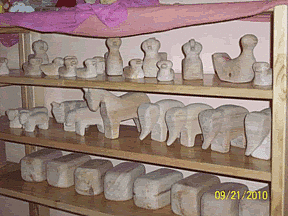 An animal figures without detail |
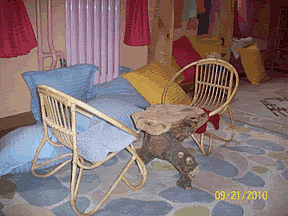 Small table and chairs near role play space |
Three Common Event Classrooms
Besides the eight classrooms, there were three other common event classrooms: the Montessori room, a general art room, and a reading room (including the rooftop garden), for every class to use in turn.
Montessori Room: Baxueyuan also applies the Montessori method and uses Montessori instruments. However, unlike many kindergartens characterized as using the Montessori method, this kindergarten does more than just provide some Montessori instruments. In the Montessori Room, children above 4 years old play with Montessori instruments because according to Big Li's approach, only children over 4 years old can practice some primary logical thinking.
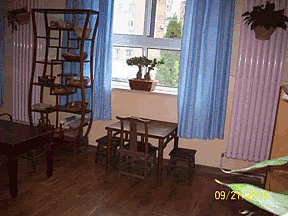 |
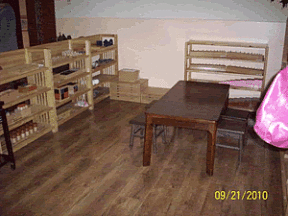 |
| Tables suited to child's height with artistic beauty cabinet for Montessori instruments | |
Actually, in addition to the Montessori Room, the Montessori method is applied in every classroom at Baxueyuan. For example, "fastening" work is done in the role play space, where children fasten buttons for dolls. In the classroom, the children make objects by screwing together actual water pipes, faucets, and bolts. Taking these materials into their hands and screwing them together is hardly a simple and boring act. The pipes and bolts are transformed into airplanes, ladders or whatever the children imagine.
Art Room: The art room is very large. Big Li did not show us into the room in order not to disturb the children who were playing there. The corridor outside the room will be made to an art gallery in the future. Big Li turned on the wall lamp and told us that childrens' works would be hung there in the lighted space, just like in an exhibition room.
Reading Room: The reading room is at the end of corridor. Standing at the gate of the reading room and looking toward the corner of stairs, it was fine after the rain, and the sunlight penetrated the light yellow curtain, turning it to an orange color, making it look warm and soft. In the reading room, there was furniture for the children to sit: a small wooden table and chairs, rattan cushions, and cotton cushions.
Outside Environment
Because of the rain, no outside activities were held. But thanks to that, we had plenty of time to take a look at the entire outside environment of Baxueyuan.
The outside space is very large. In case children get too excited while running, the outside equipment is placed in well-arranged, but disorderly fashion to give children something to do after a short run. Besides the regular swings and slides that are seen at many kindergartens, we saw some rather unfamiliar equipment: a small wooden table covered with ivy and a square pavilion with soft cloth hung on it. This is another characteristic of Baxueyuan: not to limit children to using materials inside, but to respect the children's selection. Using materials outside is more suitable for children's physical and mental needs. As a result, these strange pavilions have become resting places and a game paradise for children.
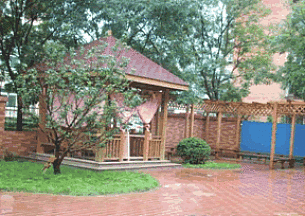 Pavilion for rest and as shelter from rain |
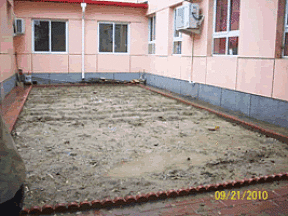 Sandbox with spade and tools for children |
The environment is very influential and the environment of Baxueyuan has created a positive atmosphere for children under Big Li's good arrangement and the teachers' delicate maintenance that is full of familial warmth, artistic beauty and respect for life.
2. Life Improvement Education
After showing us around the environment of kindergarten, Big Li invited their director and supervisor to introduce the deeper idea behind the environment of Baxueyuan.
1) Overly professional people are not necessary in preschool education
A male director would have been enough to surprise many "professionals" in this field; but more than that, the male director at Baxueyan had graduated with a degree in psychology, which was surprising to us. However, like Big Li, he had a kind of magical power that made people feel quiet and safe, just by being present. As one of its principles, preschool education at Baxueyuan is based on the idea that an overly professional staff is not necessary. Here, professionalization refers to having professional skills and professional knowledge. Being too professional only limits oneself to understanding the nature of education, but having a professional spirit is necessary for preschool education. All of the teachers at Baxueyuan are recruited from Ningxia, without any strong professional credentials, but after training, everyone has the magical power to make people feel secure. It is this magical power which makes a difference to children and helps them develop their personality in a peaceful atmosphere.
Big Li often emphasized that a teacher should understand ET (Education Timing). Every teacher should grasp proper education timing through interaction with children in daily life. Discerning and grasping--this is the kind of wisdom that a teacher should master when educating children.
As for the criteria of teacher selection, Big Li considers teachers to be part of the children's family, so they do not need strong professional skills or knowledge. First of all, it is important for the teacher to maintain family harmony: "A child who has grown up in a family full of quarrelling or in a broken family must be under excessive psychological stress; I could not put our children under the care of such a person." Second, teachers must have siblings. "Usually someone who has grown up in a multi-child family has strong social skills, works better in cooperation with others, sharing and giving, and will accept children more easily. Before, I had tried to hire someone who was an only-child as a teacher, however, after two-years of-training we were still not satisfied with her work and had to fire her." So the most important thing is a person's nature, honest and simple. In our kindergarten we do appraisals based on scoring, but more depends on intuition. "The first impression is important." And more important is that the person should have a desire to enter into the children's lives, can "love" children, but not just "like" children. "Love" is different with "like". Big Li thinks that kindergarten should be family-style, and older teachers are more patient with children than younger ones. "I like teachers who are grandmothers, and I really would like to work at a kindergarten until my old age. Imagine getting old but still having a lot of children crawling around you, how amazing that would be!"
At Baxueyuan, each class teacher has the authority to make decisions regarding the class. The material setting in every class is prepared by the kindergarten in part; while another part is made up by the teachers. Every class has class expenses, which teachers can use freely. At Baxueyuan, they all give help whether to children or to teachers based on respect. Even when it looks like a child needs help, adults will not take the liberty of helping him/her based on their own judgment, but will wait until the child asks for help. Likewise, when the president or director in charge of the teachers sees problems, they do not intervene arbitrarily, but will wait patiently until teachers find the problem themselves (Meanwhile, of course, considering efficiency, the president will arrange a regular reading/discussion seminar for teachers, giving teachers the opportunity to discover problems themselves). In such an environment, I think teachers are happy, consequently children are happy, too.
2) "Other people's clothes may not fit"
Big Li said she also has referred to a lot of the good educational philosophy of other educators or experts, e.g., Waldorf Education, Montessori Method, and Reggio Education. It is not so easy, however, to apply these methods directly, and many problems were encountered at first. In the end, it was necessary to make some revisions and absorb new things, according to the children and the situation. Big Li mentioned that, when she has had some success in education, many people visit to ask the secret, but she feels it is difficult to say because "other people's clothes may fit."
3) "A child has a lifetime to learn knowledge, but only these few years to develop his/her personality"
What Baxueyuan advocates is "education for life improvement." Its three goals are to become independent and self-directed, develop good character and behavior, and become morally self-disciplined. We hope our children learn to make judgments not on the basis of reward and punishment by adults. According to Big Li, the kindergarten especially stresses children's personality development, rather than cramming knowledge. Big Li says that a child has a lifetime to learn knowledge, but personality development takes place only during these few years.
4) "Children feel a different kind of warmth when they see their parents participating in kindergarten activities"
Baxueyuan stresses parents' participation very much and has set up avenues of family-kindergarten communication. On Yueer Li's education forum (website), every class has its own columns where they update children's activities so parents can know what their children are doing at any time. Yueer Li also has her own website on which she posts information about the children's activities and introduces educational philosophy to guide parents in education. The senior management of Baxueyuan have regular meetings with parents, called "green channels" where parents can bring up problems directly. Furthermore, they have a parent salon and one-on-one consulting. Some children have serious problems, so they need to correct the problems in cooperation with parents. The common way is to ask the entire family to come to the kindergarten with the child, and teachers then show parents how to set rules for children.
In addition, Baxueyuan holds parent training four times a year, which is now in its fourth year. The training includes learning about children, constructing principles of education, and so on. Usually, parent volunteers come here to make toys, and during this time, they are introduced to theories of education, too. At the kindergarten's annual drama festival, parents write scripts, which the children then perform. Big Li thinks that it really makes a difference to the children when their parents participate in kindergarten activities together with them."
5) Help children build character
More than 70 children in 5 sessions have graduated from Baxueyuan. In a follow-up study of 50 children, 18-19 have entered famous schools and rank at the top of the class; 4-5 still need parental supervision. Most do not worry their parents too much. They are positive about learning and have a sense of achievement. According to Big Li, "Many of them rank in the middle to top academically, scoring 95-98. I tell parents that is enough. "
As a common feature, most children from Baxueyuan tend to find the first 1-2 months of primary school to be difficult, but show amazing capacity and potential after one semester. That can be attributed to the Baxueyuan education. Children at Baxueyuan enter the Montessori class at the age of 4 to train logical thinking. From 5 years of age, they engaged in many activities that have been designed to ready them for primary school, such as outdoor survival, farm work, football and so forth, with more survival activities and less academic knowledge. However the children from Baxueyuan can protect themselves and do not fear adults. Big Li told us several vivid stories. We could not help laughing, and felt that it was really an education that built character. The following is an example.
A story of "being late"
A girl was late for class, and reported it aloud at the entrance of the classroom. The teacher criticized her, "how could you be late?" The girl answered with no fear, "It's really my fault that I am late, but I can go to the office with you to solve the problem, and I promise I won't be late next time." However, the girl was late again on the next day. She stood at the entrance and said to teacher, "I will go to your office."
This story tells us how the Baxueyuan child obeys rules and has his/her own idea. A child with integrated personality has the ability to protect him/herself from being hurt in heart; and can make full use of his/her abilities in anything.
Postscript
Coming back from Baxueyuan, the question occurred to me again: what kind of preschool education is a good education? Through argument and discussion, it can be concluded that a good education is an education suitable for children. However, then the question arises "what kind of preschool education is an education suitable for children?" At Baxueyuan, Big Li has given us her answer. "Divide the whole of basic life activities into small parts according to children's actual needs in life, and design some different corners in the kindergarten that correspond to these small parts. These corners are like channels, and children's developmental abilities are like water. Water flows into channels naturally. Based on the living education, children will learn to live and treasure life, which is a natural result."
Regarding this question of the most suitable education for children, I think everyone will find his/her own answer. I will keep looking until I find one that satisfies me














